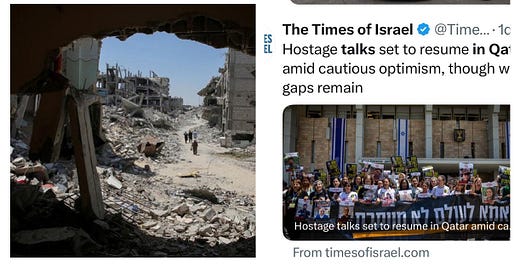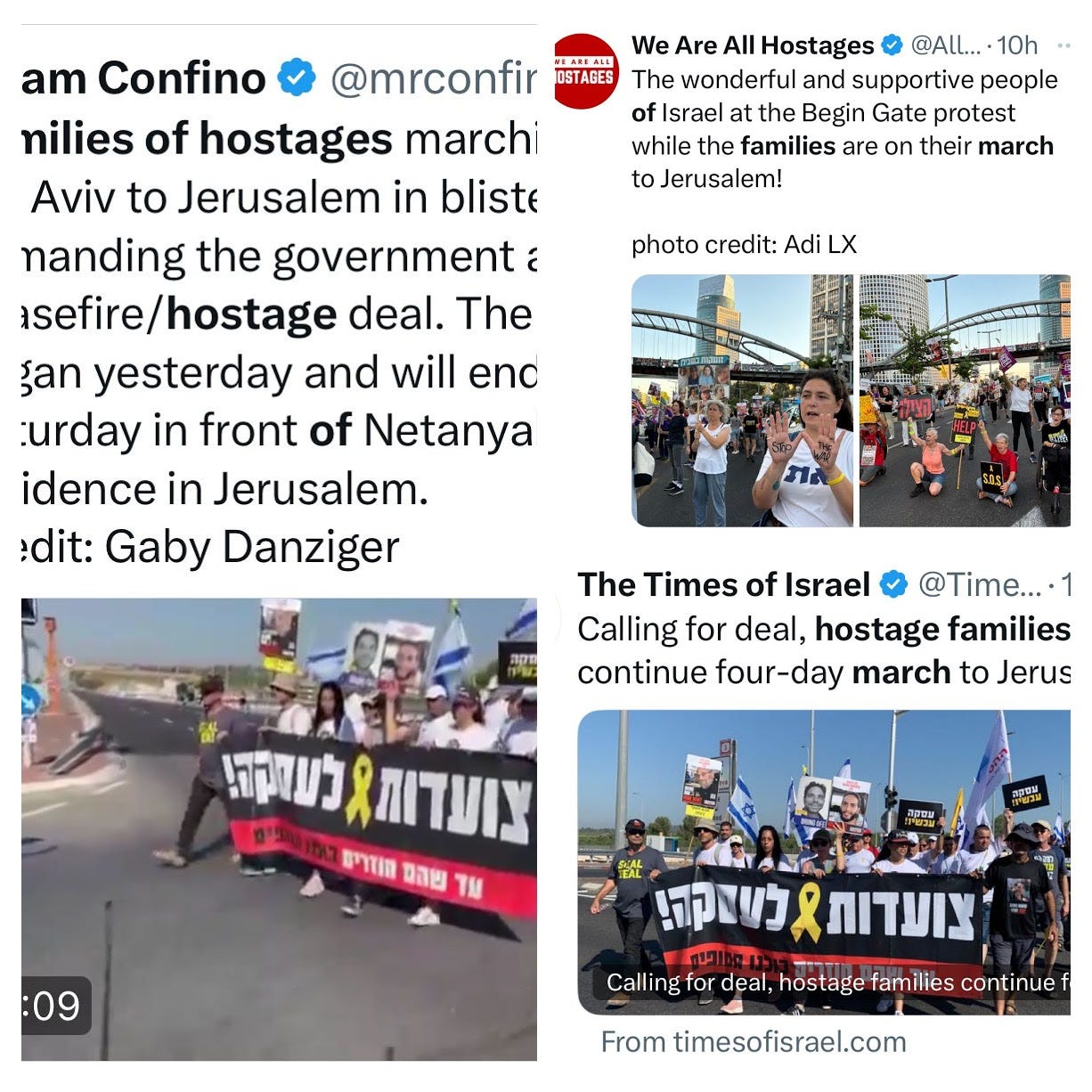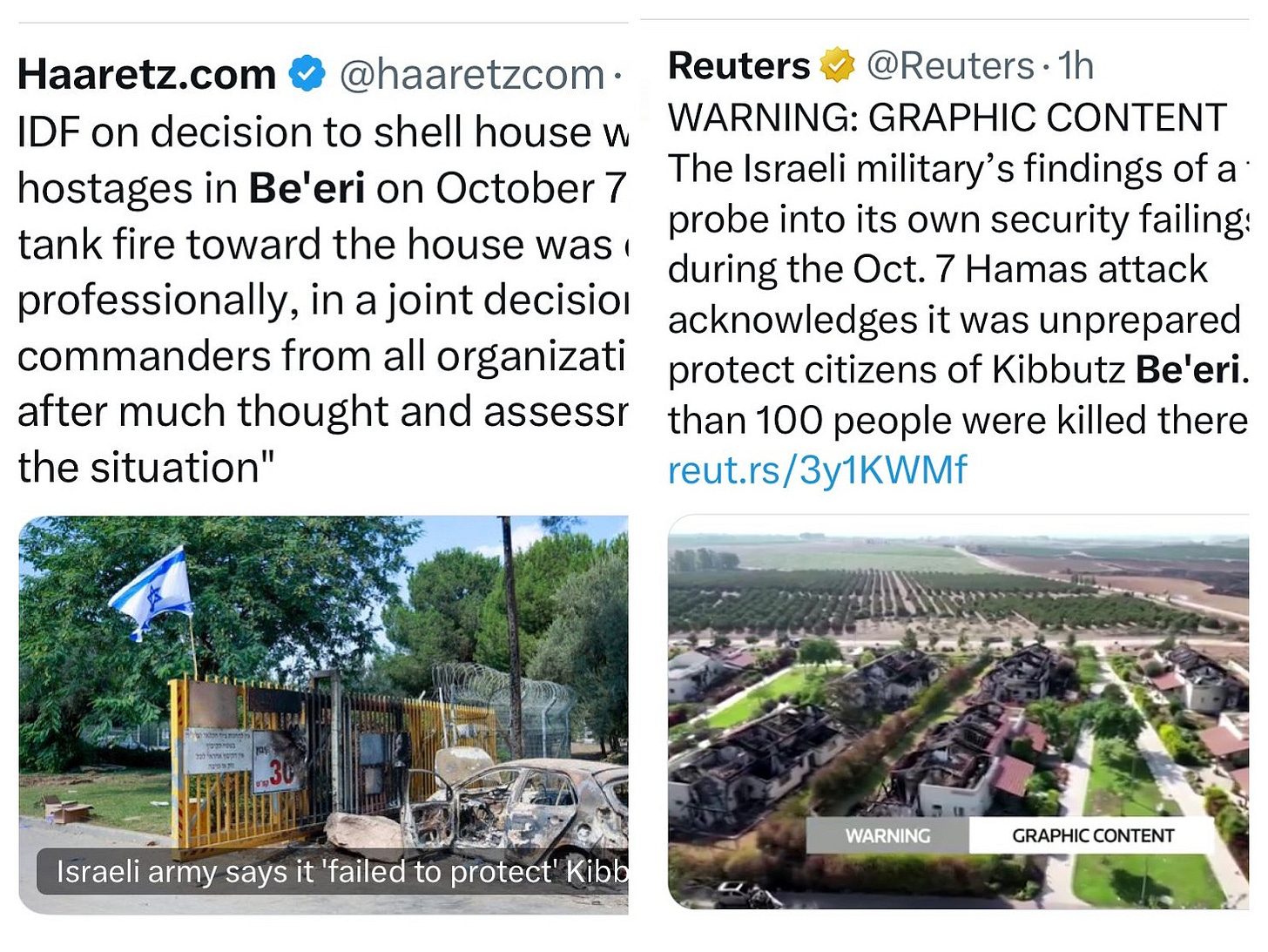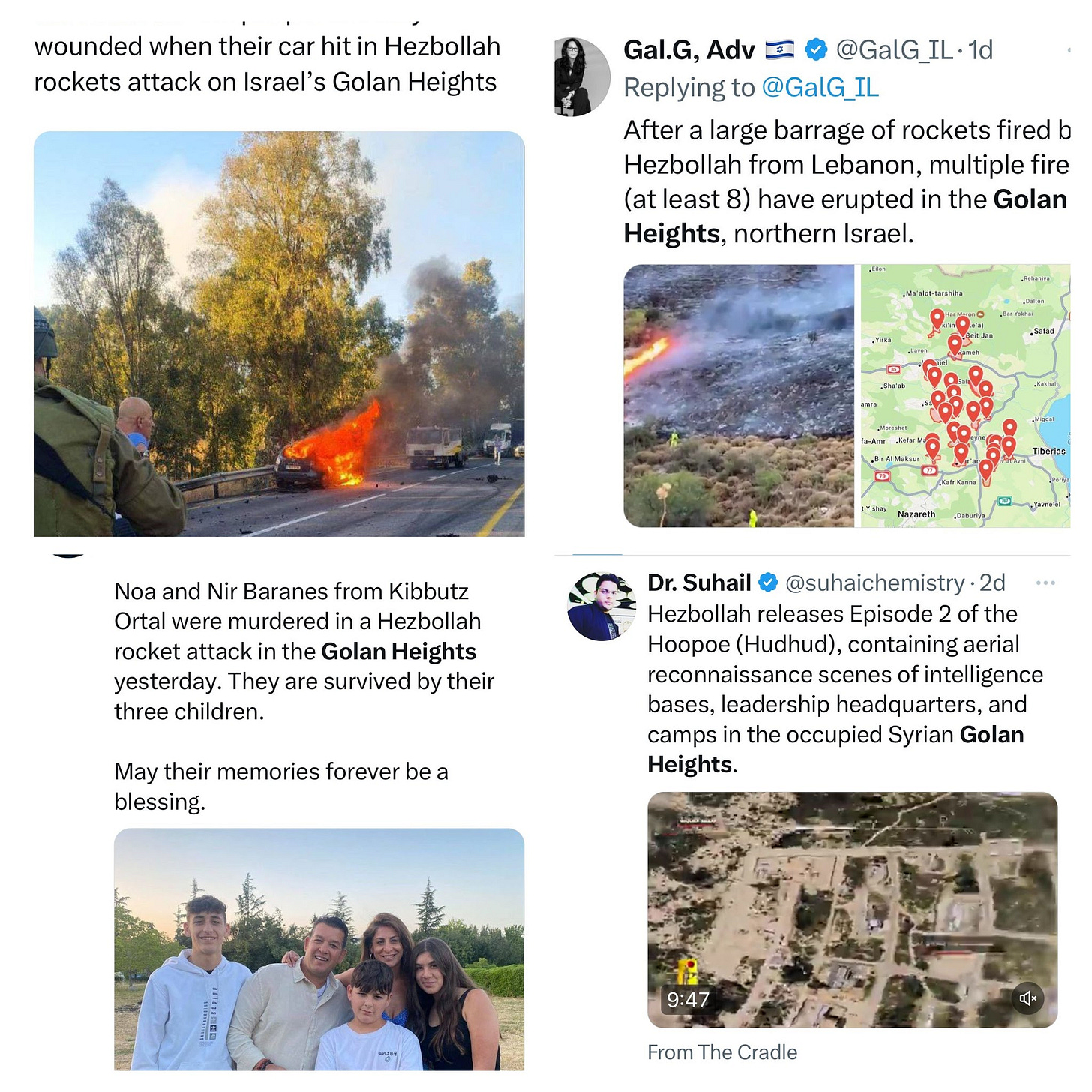Israel at War - Day 280
1. Some Progress in Negotiations on Hostage Deal
A summit in Qatar indicated that Israel and Hamas are getting closer to an understanding. Israeli Mossad chief, David Barnea, and head of Shin Beit, Ronen Bar, traveled to Doha Qatar to meet with the head of the CIA, Bill Burns, and the head of Egyptian intelligence. They met in Qatar with local senior officials who represent Hamas. All the parties reported progress and a mechanism to bridge the gap between the two sides. PM Netanyahu said in a public event that he believes that most of the living hostages held by Hamas in Gaza since October 7th will be released in the first phase of the deal. Hamas still insists that the deal includes three components: the end of the war, Israel opening a passage that enables Palestinians in Gaza to go back to the northern part of the Gaza Strip which was occupied by Israel, and the release of senior military Hamas members and other Palestinians held in Israeli prisons. Israel opposes all those demands, it is still not clear yet which side will have a better deal. Earlier this week, and in previous weeks Netanyanu tried to sabotage the deal by creating more obstacles and setting pre-conditions before the Israeli delegation left for another meeting. It is no secret that the Biden Administration puts pressure on PM Netanyahu, to close a deal and declare a cease-fire to end the war.
Netanyahu's allies in the government, Jewish Power (Otzma Yehudit) led by Itamar Ben Gvir, and Religious Zionists, led by Betzalel Smotrich, strongly oppose a deal with Hamas that will force Israel to end the war, and they both threaten to dissolve the coalition.
2. Hostage Families Started Four Day March to Jerusalem to Put Pressure on PM Netanyahu and his Government to Agree to a Deal
Many Israelis joined a four day march from Tel Aviv to Jerusalem. This march was initiated by some of the families of the 120 Israelis who are still held captive in Gaza since October 7th, 280 days ago. About 250 Israelis were abducted on October 7th from their homes in the communities on the border with Gaza, and 1,200 were murdered by Hamas operators. Some of the hostages, mainly children and elderly women, were released in the first deal months ago, a few were rescued by Israeli military forces and many were declared dead. Of the 120 Israelis that are still held by Hamas in Gaza, about 60-70 are thought to be alive. Their families are doing all they can to keep the issue high on the public agenda. The families hope that many more Israeli will join their march to express solidarity and support.
Neither all Israelis nor all elected leaders priotize hostage release on the political decision making agenda. Earlier this week a family member of one of those hostages was forcefully expelled from a Knesset committee when he tried to raise awareness and discuss his brother who is held in very bad conditions by Hamas in Gaza. The head of the committee, who earlier in the term of the government was the leader of the judicial overhaul, Simcha Rothman, was the one who ordered him expelled from the Knesset.
3. Israel Defense Force (IDF) Failed to Protect The People of Be’eri, The Soldiers Failed to Prevent Hamas Operators from Carrying Out a Trail of Murder
The IDF published the first research report on the performance of the army units on October 7th, when hundreds of Hamas militants brutally entered the small community on the border with Gaza, and orchestrated an organized deadly operation. They managed to murder 101 civilians, as well as 31 security personnel and kidnapped 32 residents to Gaza. Eleven Be’eri residents are still held hostage. It took hours before the first help reached the residents who were under attack, and in many cases it was already too late. In a press conference that was broadcast live, an IDF spokesperson openly, and in a candid announcement, took full responsibility for the failure and asked for forgiveness.
People of Be’eri, a kibbutz of 1,000 residents cried for help for hours. They were slaughtered, their homes were set on fire and destroyed by bombs and hand grenades while there was no response and no help. For many of them it was too late when eventually the help arrived. The IDF regained full control of the kibbutz only more than two days later, and only then managed to neutralize all the Hamas militants. Be’eri was one of the symbols of October 7th. One of the most striking events took place at one of the homes, of a woman called Pessi, where Hamas militants gathered a few hostages. Eventually in order to gain control on the situation the IDF had to fire tank shells on the house that may have killed Israeli hostages together with Hamas militants.
4. Civilian Causalities and Fires Follow Hizbollah Barrage of Drones and Missiles in Northern Israel
A civilian couple from a kibbutz in the Golan Heights in northern Israel were killed earlier this week by a direct hit to their car from a Hizbollah missile. They left behind three children aged 18, 15 and 13.
An initial IDF investigation showed that the Iron Dome missile defense system did not intercept the rocket that hit the couple’s car because the area was classified as an "open area." The Iron Dome does not attempt to intercept missiles which are calculated to fall in an open area like fields or areas that do not have housing.
The rockets that hit the civilians and started fires in several locations in northern Israel were part of a Hizbollah missile attack, launched in retaliation for the killing of Yasser Karnbash, a former Hezbollah member. Karnbash was killed by an IDF drone attack on a vehicle on the Beirut-Damascus Road, next to a Syrian army outpost. Later in the week, the IDF, in an airstike in Syria, killed a former bodyguard of the leader of the Lebanese militant group Hezbollah
As tensions in the northern front continue, Hezbollah released what it claimed are photographs of IDF bases and military infrastructure in northern Israel taken by a drone launched from Lebanon. Officials in Israel's defense establishment said they believe the images are authentic. The IDF said it intercepted two drones that crossed into Israel from Lebanon.
5. President Macron Accuses Israeli Diaspora Minister of Interfering in French Elections
The Israeli media and public closely followed and reported on the elections in France. Shortly after the results were announced, an Israeli journalist reported that in a phone conversation between Frances’ President Macron and PM Netanyahu, several days before the elections, Macron accused Israeli minister of Diaspora Affairs Amichai Chikli of Interfering in the elections by voicing his support for Marine Le Pen’s far right National Rally party. In the call, Macron warned Netanyahu that openly and blatantly supporting Marine Le Pen’s party constituted "unacceptable" interference in France's internal affairs.
Minister Chikli, according to an Israeli diplomatic source, has operated independently in forging ties with far-right parties in several European countries. In the weeks preceding the elections in France, Chikli posted on social media and said in an interview to an Israeli news channel that he hopes Marine Le Pen wins the elections.
Israeli diplomats said that Chikli’s public endorsement of Le Pen damaged relations with France. One Israeli official described the incident as “a diplomatic bomb”. To minimize the damage, foreign minister Israel Katz wrote on social media that Israel does not interfere in other countries’ domestic issues.
To our readers: Please note that we embed links to further details/articles behind the summaries for each item. You can see the links by their blue color and, if you are interested in further details, you can click on the link to access the relevant article/s.










